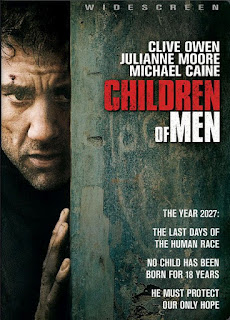Alfonso Cuaron’s
“Children of Men” (2006) imagines a bleak future that is not the result of a
nuclear war, a fallen meteor, or the ever-popular zombie outbreak. This
possible future planet earth is going down the drain because humanity itself is
slowly ebbing away after eighteen years of infertility. Set in not-so-distant
future in the United Kingdom, the film shows a world overrun with pollution,
corruption, massive immigration, and a totalitarian police force. You know it
is the future, since all of the bright colors are gone.
I first saw this movie
at an art-house cinema during my first year at Sherbrooke University. The bleak
future reminded me of the PC game Half-Life 2. This game, much like “Children
of Men,” featured a city controlled by a totalitarian police force. Except,
while the game was senseless fantasy, the movie has a much more visceral feel
since it is much more grounded in reality. You just need to look at the news footage
to think we are one global catastrophe away from the scenario depicted by
Cuaron.
Exactly why are women
infertile in the not-so-distant future? Government bureaucrat Theo Faron (Clive
Owen) and his old hippie friend (Michael Caine) discuss this in his country
house, but for Theo the answer is irrelevant. He has accepted the end of
humanity and sees no hope for the future. That is until his estranged wife
Julian (Julianne Moore) comes seeking his help.
Julian is the leader
of an immigrants rights group called The Fishes. She needs Theo’s contacts as a
government employee to secure transit documents for a black female refugee
named Kee (Clare-Hope Ashitey). Why take such risks for one refugee? Because,
that refugee is the first pregnant woman the world has seen in 18 years. The
plan is to take her to the coast and then to a boat that will take her to The
Human Project, a scientific group dedicated to curing infertility.
Whether that group
truly exists is unknown. No contact with anyone outside of England is ever
made. For all Theo knows there could be nothing waiting for Kee once they reach
the coast. Yet as violence escalates between government and revolutionary
forces, it becomes clear Kee and her child must flee if they wish to stay
alive. One child could bring hope to all of humanity, but both the government
and Julian’s group would kill to use that child as a political tool.
The movie explores
very important themes, such as hope and faith, while depicting battle scenes
that are distressing in their realism. There is no fast editing or CG
enhancement to make this entertaining. The award-winning cinematography, by
Emmanuel Lubezki, makes you feel like you are following Theo in the middle of
war zone. A particularly great sequence, recorded as a single-shot, involves an
attack in a country road. The attack is shot from inside a car as an armed gang
ambushes the car and throws rocks at the windows. The chaos of the attack makes
you feel as though you are right there with the characters.
Owen is very effective
in the role of Theo, an everyman thrust in the role of an unlikely savior. When
war erupts around him he is scared for both himself and the girl. A situation
forces him to kill a man with a brick, but it is clear he has never done such a
thing before in his life. He stumbles and hesitates as he prepares to bash the
man’s head. It’s almost funny.
The final scenes show
you how horrifying and devastating war can be. The world is falling apart, the
city is torn to pieces, and the best thing people can think of doing is pick up
guns and shoot each other. This world is humanity at its worse. It is bleak,
dirty, violent, and filled with misery.
Yet, this is a hopeful
film. Maybe there is no Human Project, but the idea that it might exist is
enough to make Theo do the right thing. He began as a hopeless man, but hope
gave him a purpose: to protect a life instead of destroying one.

Alfonso Cuaron's “Children of Men” (2006) imagines a bleak future that is not the result of a nuclear war, a fallen meteor, or the ever-popular ... 1childrenofmen.blogspot.com
ReplyDelete